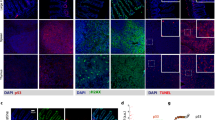Abstract
Gamma-knife radiosurgery is one of the only means of treating otherwise inoperable intracranial neoplasia. At present the mechanism by which single-dose γ-radiation reduces tumor bulk is unknown. Using the human mammary cell line MCF-7 to represent a metastatic tumor often treated by γ-knife radiosurgery, we show here that γ-radiation provided by the γ knife dose dependency reduced growth and a component of this response was the induction of apoptotic cell death. Since we have shown previously that, for estrogen receptor-containing pituitary tumor cells, the pure antiestrogen, ZM 182780, modulates cell survival, further experiments were performed in which γ-irradiation was combined with ZM 182780 or the more familiar antiestrogen, tamoxifen. Our data demonstrate that although tamoxifen was as effective as ZM 182780 at blocking the transcriptional activity of the estrogen receptor, it was the pure antiestrogen that significantly enhanced apoptosis induced by γ-irradiation. These results on combining γ-irradiation with a pure antiestrogen offer a new therapeutic paradigm by which the effectiveness of γ-knife treatment could be enhanced by agents that modulate the apoptotic pathway.
Similar content being viewed by others
REFERENCES
Hall EJ: Radiobiology for the Radiologist. Philadelphia, Lippincott, 1994, pp 29–43
Arends MJ, Wyllie AH: Apoptosis: Mechanisms and roles in pathology. Int Rev Exp Pathol 32:223–254, 1991
Wyllie AH, Kerr JFR, Currie AR: Cell death: The significance of apoptosis. Int Rev Cytol 68:251–306, 1980
Kerr JFR, Winterford CM, Harmon BV: Apoptosis. Its significance in cancer and cancer therapy. Cancer 73:2013–2026, 1993
Li YQ, Guo YP, Jay V, Stewart PA, Wong CS: Time course of radiation-induced apoptosis in the adult rat spinal cord. Radiother Oncol 39:35–42, 1996
Stephens LC, Schultheiss TE, Price RE, Ang KK, Peters LJ: Radiation apoptosis of serous acinar cells of salivary and lacrimal glands. Cancer 67:1539–1543, 1991
Vrdoljak E, Bill CA, Stephens LC, Van der Kogel AJ, Ang KK, Tofilon PJ: Radiation-induced apoptosis of oligodendrocytes in vitro. Int J Radiat Biol 62:475–480, 1992
Yanagihara K, Nii M, Numoto M, Kamiya K, Tauchi H, Sawada S, Seito T: Radiation-induced apoptotic cell death in human gastric epithelial tumour cells: Correlation between mitotic death and apoptosis. Int J Radiat Biol 67:677–685, 1995
Tauchi H, Sawada S: Analysis of mitotic death caused by radiation in mouse leukaemia L5178Y cells: Apoptosis is the ultimate form of cell death following mitotic failure. Int J Radiat Biol 65:449–455, 1994
Newton CJ: Estrogen receptor blockade by the pure antiestrogen, ZM 182780, induces death of pituitary tumour cells. J Steroid Biochem Mol Biol 55:327–337, 1995
Behl C, Lezoualc'h F, Trapp T, Widermann M, Skutella T, Holsboer F: Glucocorticoids enhance oxidative stress-induced cell death in hippocampal neurones in vitro. Endocrinology 138: 101–106, 1997
Schwartzman RA, Cidlowski JA: Apoptosis: The biochemistry and molecular biology of programmed cell death. Endocr Rev 14: 133–151, 1993
Hafner F, Holler E, von Angerer E: Effect of growth factors on estrogen receptor mediated gene expression. J Steroid Biochem Mol Biol 58:385–393, 1996
Newton CJ, Trapp T, Pagotto U, Renner U, Buric R, Stalla GK: The estrogen receptor modulates growth of pituitary tumour cells in the absence of exogenous estrogen. J Mol Endocrinol 12: 303–312, 1994
Kapriaanou N, English HF, Davidson NE, Isaacs JT: Programmed cell death during regression of the MCF-7 human breast cancer following estrogen ablation. Cancer Res. 51:162–166, 1991
Warri AM, Huovinen RL, Laine AM, Martikainen PM, Härkönen PL: Apoptosis in toremifene-induced growth inhibition of human breast cancer cells in vivo and in vitro. J Natl Cancer Inst 85: 1412–1418, 1993
Wilson JW, Wakeling AE, Morris ID, Hickman JA, Dive C: MCF-7 human mammary adenocarcinoma cell death in vitro in response to hormone-withdrawal and DNA damage. Int J Cancer 61:502–508, 1995
James SY, Mackay AG, Colston KW: Effects of 1,25 dihydroxyvitamin D3 and its analogues on induction of apoptosis in breast cancer cells. J Steroid Biochem Mol Biol 58:395–401, 1996
Simboli-Campbell M, Narvaez CJ, Tenniswood M, Welsh JE: 1,25-Dihydroxyvitamin D3 induces morphological and biochemical markers of apoptosis in MCF-7 breast cancer cells. J Steroid Biochem Mol Biol 58:367–376, 1996
Newton CJ, Renner U, Stalla GK: Estrogen receptor blockade enhances apoptotic sensitivity of tumour cells to calmodulin inhibition. J Endocrinol 152s:99, 1997
Teixeira C, Reed JC, Pratt MAC: Estrogen promotes chemotherapeutic drug resistance by a mechanism involving bcl-2 proto-oncogene expression in human breast cancer cells. Cancer Res 55: 3902–3907, 1995
Wang TT, Phang JM: Effects of estrogen on apoptotic pathways in human breast cancer cell line MCF-7. Cancer Res 55:2487–2489, 1995
Chander SK, McCague R, Luqmani Y, Newton CJ, Dowsett M, Jarman M, Coombes RC: Pyrrolidino-4-iodotamoxifen and 4-iodotamoxifen, new analogues of the antiestrogen tamoxifen for the treatment of breast cancer. Cancer Res 51:5851–5857, 1991
McDonnell DP, Lieberman BA, Norris J: Development of tissue-selective estrogen receptor modulators. In Organ-Selective Actions of Steroid Hormones. DT Baird, G Schütz, R Krattenmacher (eds). Berlin, Springer-Verlag, 1995, pp 1–28
Levitzki A, Gazit A: Tyrosine kinase inhibition: An approach to drug development. Science 267:1782–1788, 1995
Author information
Authors and Affiliations
Rights and permissions
About this article
Cite this article
Newton, C.J., Schlatterer, K., Stalla, G.K. et al. Pharmacological Enhancement of Radiosurgery Response: Studies on an in Vitro Model System. Journal of Radiosurgery 1, 51–56 (1998). https://doi.org/10.1023/B:JORA.0000010877.65003.31
Issue Date:
DOI: https://doi.org/10.1023/B:JORA.0000010877.65003.31




